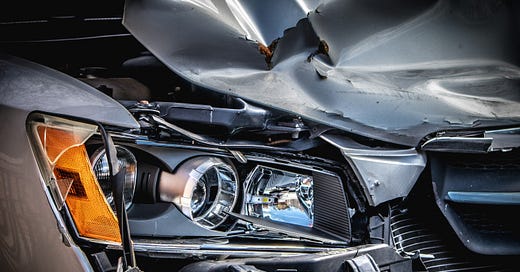Like all things in life, the question of buying a late model car vs. buying an older one has trade-offs.
Trade-offs and opportunity costs
For most of us, it’s a no-brainer. If you’re not planning to work on your car, it makes sense to buy a newer car. New cars need less maintenance, even though maintaining a new car may be more expensive.
Older cars require maintenance more frequently.
An electric vehicle (EV) may need maintenance rarely.
But if you get into an accident, the cost of repairing a new car gets expensive.
Opportunity cost is what you give up or the value of the next best alternative.With an older car, you might be able to fix the damage for less than a thousand dollars.
Need a new bumper? A repair person will grab one that matches from a junk yard and install it for you.
In the only accident I caused, that’s what happened. All I needed was a new bumper. The auto body shop got me a used one with an expired pass to Fort McPherson.
I’ve never been to Fort McPherson.
I had power windows though (not always standard then), and replacing the door would have been more expensive.
Newer cars not only have sensors in the door, but also in the bumper.
For example, my husband hit a deer a couple of years ago. The driver’s side door as well as the front light had to be replaced.
Our 2019 model has doors with sensors to show if there’s another car coming up on the side. The front lights sense when there’s oncoming traffic, so it can turn down the brights. Those lights automatically go to bright in a low light environment, like the area near our home.
That accident? The bill was over $5000. In a newer car, it would be even more expensive.
With extra tariffs in place the price would be even higher.
As a result, insurance is more expensive. Car insurance price inflation is the highest rate among goods and services used in the Consumer Price Index (CPI).
Using opportunity cost to make decisions
So, using just opportunity costs, how can you make a decision when buying a car?
Examine the costs and the benefits of each good alternative to use opportunity costs when making a high-value decision.For a new car (to you), you might want to look at your driving record. Accident prone? Consider an older model.Examine the costs and the benefits of each good alternative to use opportunity costs when making a high-value decision.
Mom or dad looking to buy a car for your sixteen-year-old? You’ll want an older car, just to keep your car insurance down.
Thank you for reading,
Nikki





Still driving my 20-year-old car
Outside of NYC and maybe San Francisco, how many individuals use ride-sharing exclusively as a transportation substitute?